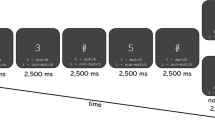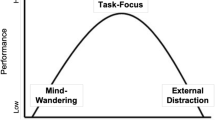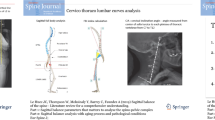Abstract
The dual-task paradigm has previously been used to investigate the attentional demands associated with postural control. Previous studies have identified both the focus of attention and the difficulty of a postural task as potential factors influencing dual-task performance. The aim of this study was to examine how the instructed focus of attention influences dual-task performance during quiet standing tasks of various levels of difficulty. Thirteen young adults participated in two testing sessions consisting of standing as still as possible on a force platform in different postural conditions, while simultaneously performing a simple reaction time (RT) task. Postural task difficulty was manipulated by various combinations of three bases of support (feet together, tandem and single leg) and two visual conditions (eyes opened and closed). Participants were instructed to focus on either their balance or their RT performance, depending on the testing session. When comparing postural control with respect to session focus, anterior–posterior sway velocity decreased with the addition of the simple RT task when the focus was on balance, but only during the more difficult dual-task conditions. In contrast, sway area and medial–lateral sway velocity did not change between the two instructed focus sessions. Participants responded faster in all dual-task conditions when focusing on RT performance than on balance. The modified attention allocation index indicated that participants’ ability to modulate their allocation of attentional resources to respond positively to instruction was more pronounced in the most challenging postural condition. The present findings could have important implications for the interpretation of dual-task performance in both clinical and research settings.



Similar content being viewed by others
References
Allport A (1987) Selection for action: some behavioral and neurophysiological considerations of attention and action. In: Heuer H, Sanders AF (eds) Perspectives on perception and action. Erlbaum, Hillsdale, NJ, pp 395–419
Broadbent DE (1958) Perception and communication. Pergamon Press, London
Dault MC, Geurts AC, Mulder TW, Duysens J (2001) Postural control and cognitive task performance in healthy participants while balancing on different support-surface configurations. Gait Posture 14:248–255. doi:10.1016/S0966-6362(01)00130-8
Dault MC, Yardley L, Frank JS (2003) Does articulation contribute to modifications of postural control during dual-task paradigms? Brain Res Cogn Brain Res 16:434–440. doi:10.1016/S0926-6410(03)00058-2
Deutsch JA, Deutsch D (1963) Some theoretical considerations. Psychol Rev 70:80–90
Fraizer EV, Mitra S (2008) Methodological and interpretive issues in posture-cognition dual-tasking in upright stance. Gait Posture 27:271–279. doi:10.1016/j.gaitpost.2007.04.002
Fraizer EV, Suvobrata M (2008) Postural costs of performing cognitive tasks in non-coincident reference frames. Exp Brain Res 185:429–441. doi:10.1007/s00221-007-1163-1
Huxhold O, Li SC, Schmiedek F, Lindenberger U (2006) Dual-tasking postural control: aging and the effects of cognitive demand in conjunction with focus of attention. Brain Res Bull 69:294–305. doi:10.1016/j.brainresbull.2006.01.002
Kahneman D (1973) Attention and effort. Prentice-Hall, Englewood Cliffs, NJ
Kelly VE, Janke AA, Shumway-Cook A (2010) Effects of instructed focus and task difficulty on concurrent walking and cognitive task performance in healthy young adults. Exp Brain Res 207:65–73. doi:10.1007/s00221-010-2429-6
Kerr B, Condon SM, McDonald LA (1985) Cognitive spatial processing and the regulation of posture. J Exp Psychol Hum Percept Perform 11:617–622
Lajoie Y, Teasdale N, Bard C, Fleury M (1993) Attentional demands for static and dynamic equilibrium. Exp Brain Res 97:139–144
Mitra S, Fraizer EV (2004) Effects of explicit sway-minimization on postural–suprapostural dual-task performance. Hum Mov Sci 23:1–20. doi:10.1016/j.humov.2004.03.003
Neumann O (1987) Beyond capacity: a functional view of attention. In: Heuer H, Sanders AF (eds) Perspectives on perception and action. Erlbaum, Hillsdale, NJ, pp 361–394
Pashler H (1994) Dual-task interference in simple tasks: data and theory. Psychol Bull 116:220–244
Prado JM, Stoffregen TA, Duarte M (2007) Postural sway during dual tasks in young and elderly adults. Gerontology 53:274–281. doi:10.1159/000102938
Remaud A, Boyas S, Caron GA, Bilodeau M (2012) Attentional demands associated with postural control depend on task difficulty and visual condition. J Mot Behav 44:329–340. doi:10.1080/00222895.2012.708680
Ruhe A, Fejer R, Walker B (2010) The test-retest reliability of centre of pressure measures in bipedal static task conditions—a systematic review of the literature. Gait Posture 32:436–445. doi:10.1016/j.gaitpost.2010.09.012
Siu KC, Woollacott MH (2007) Attentional demands of postural control: the ability to selectively allocate information-processing resources. Gait Posture 25:121–126. doi:10.1016/j.gaitpost.2006.02.002
Stoffregen TA, Smart LJ Jr, Bardy BG, Pagulayan RJ (1999) Postural stabilization of looking. J Exp Psychol Hum Percept Perform 25:1641–1658
Stoffregen TA, Pagulayan RJ, Bardy BG, Hettinger LJ (2000) Modulating postural control to facilitate visual performance. Hum Mov Sci 19:203–220
Vuillerme N, Nafati G (2007) How attentional focus on body sway affects postural control during quiet standing. Psychol Res 71:192–200. doi:10.1007/s00426-005-0018-2
Vuillerme N, Vincent H (2006) How performing a mental arithmetic task modify the regulation of centre of foot pressure displacements during bipedal quiet standing. Exp Brain Res 169:130–134. doi:10.1007/s00221-005-0124-9
Vuillerme N, Nougier V, Teasdale N (2000) Effects of a reaction time task on postural control in humans. Neurosci Lett 291:77–80. doi:10.1016/S0304-3940(00)01374-4
Wickens CD (1989) Attention and skilled performance. In: Holding DH (ed) Human skills. John Wiley & Sons, New York, NY, pp 71–105
Woollacott M, Shumway-Cook A (2002) Attention and the control of posture and gait: a review of an emerging area of research. Gait Posture 16:1–14. doi:10.1016/S0966-6362(01)00156-4
Wulf G, Mercer J, McNevin N, Guadagnoli MA (2004) Reciprocal influences of attentional focus on postural and suprapostural task performance. J Mot Behav 36:189–199. doi:10.3200/JMBR.36.2.189-199
Wulf G, Tollner T, Shea CH (2007) Attentional focus effects as a function of task difficulty. Res Q Exerc Sport 78:257–264
Yogev-Seligmann G, Rotem-Galili Y, Mirelman A, Dickstein R, Giladi N, Hausdorff JM (2010) How does explicit prioritization alter walking during dual-task performance? Effects of age and sex on gait speed and variability. Phys Ther 90:177–186. doi:10.2522/ptj.20090043
Yogev-Seligmann G, Rotem-Galili Y, Dickstein R, Giladi N, Hausdorff JM (2012) Effects of explicit prioritization on dual task walking in patients with Parkinson’s disease. Gait Posture 35:641–646. doi:10.1016/j.gaitpost.2011.12.016
Acknowledgments
The authors would like to thank Megan Bryanton for her useful comments that helped improve the quality of this manuscript. This study was funded in part by the Natural Sciences and Engineering Research Council of Canada (Discovery Grant # 312041-2008 to M. Bilodeau) and the Canada Foundation for Innovation (Leaders Opportunity Fund Award to M. Bilodeau).
Conflict of interest
The authors declare that they have no conflict of interest.
Author information
Authors and Affiliations
Corresponding author
Rights and permissions
About this article
Cite this article
Remaud, A., Boyas, S., Lajoie, Y. et al. Attentional focus influences postural control and reaction time performances only during challenging dual-task conditions in healthy young adults. Exp Brain Res 231, 219–229 (2013). https://doi.org/10.1007/s00221-013-3684-0
Received:
Accepted:
Published:
Issue Date:
DOI: https://doi.org/10.1007/s00221-013-3684-0




